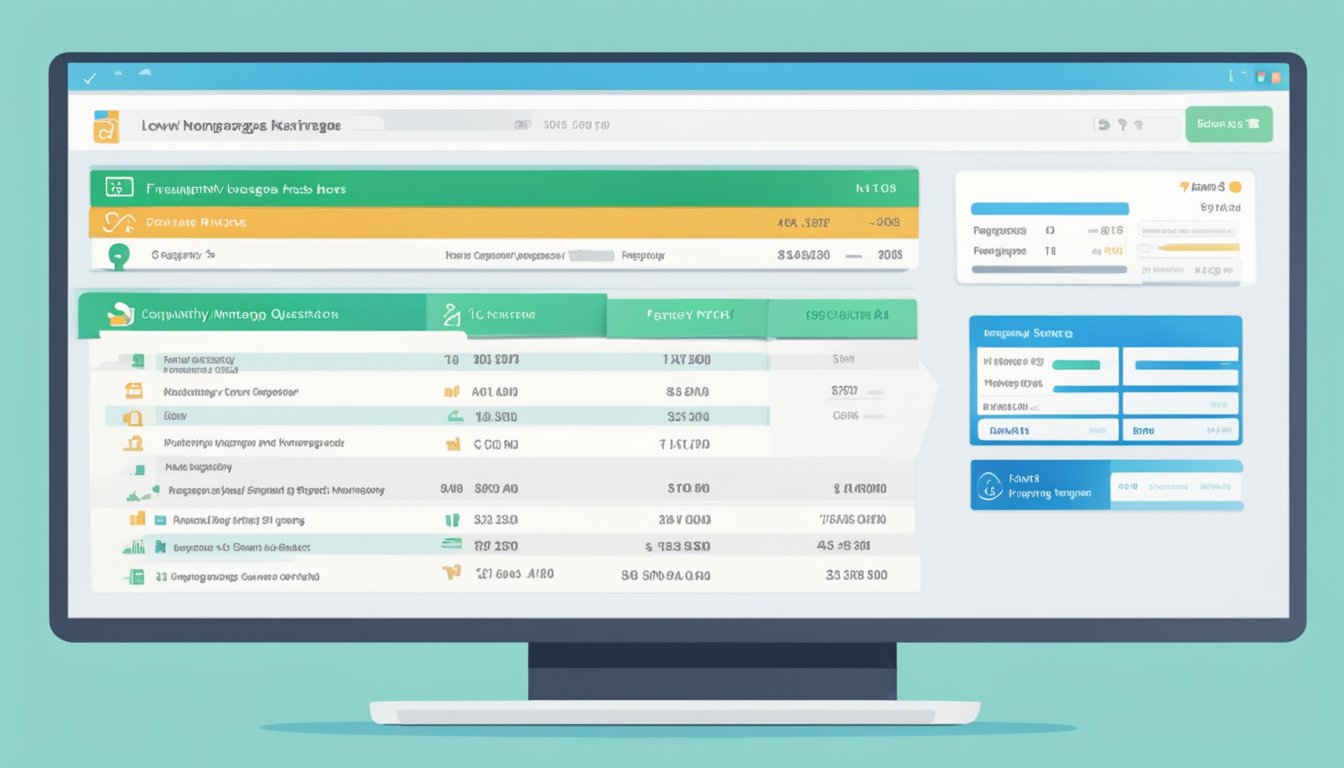If you’re looking to buy a property in Singapore, you’ll need to consider how you’re going to finance it. One of the most common ways to do this is through a home loan, and the first thing you’ll want to look for is the lowest mortgage rate in Singapore. A low mortgage rate can make a big difference in how much you end up paying for your property in the long run, so it’s important to find the best deal possible.

Understanding mortgage rates in Singapore can be a bit confusing, but it’s important to take the time to research and compare your options. Mortgage rates can be fixed or variable, and they can vary depending on the lender and the type of property you’re buying. Your credit score and financial history can also impact the mortgage rate you’re offered. By doing your research and shopping around, you can find the lowest mortgage rate in Singapore that meets your needs and budget.
Key Takeaways
- Finding the lowest mortgage rate in Singapore is important to help you save money in the long run.
- Mortgage rates can vary depending on the lender, type of property, and your financial history.
- By researching your options and shopping around, you can find the best mortgage rate in Singapore for your needs and budget.
Understanding Mortgage Rates in Singapore

If you’re planning to purchase a property in Singapore, one of the most important things you’ll need to consider is the mortgage rate. Understanding how mortgage rates work can help you make an informed decision when choosing a home loan package.
Interest Rate Types
In Singapore, there are two main types of interest rates – fixed and floating. Fixed interest rates remain the same throughout the loan tenure, while floating interest rates can fluctuate based on market conditions.
Fixed interest rates provide certainty and stability as your monthly repayments remain the same, regardless of market conditions. On the other hand, floating interest rates may offer lower rates initially, but can be subject to volatility and fluctuations over time.
Impact of Market Conditions
Mortgage rates in Singapore are often pegged to either the Singapore Interbank Offered Rate (SIBOR) or the Singapore Overnight Rate Average (SORA). These benchmark rates are influenced by market conditions such as the global economic climate and central bank policies.
In times of economic uncertainty or high volatility, mortgage rates may increase due to higher risk premiums. Conversely, during periods of economic stability, mortgage rates may decrease due to lower risk premiums.
It’s important to note that mortgage rates are also influenced by the spread, which is the difference between the benchmark rate and the interest rate charged by the bank. A lower spread can result in lower mortgage rates, making it important to compare packages from different banks to find the best deal.
In conclusion, understanding mortgage rates in Singapore is crucial when choosing a home loan package. By considering the different interest rate types and the impact of market conditions, you can make an informed decision and secure the best mortgage rate for your needs.
Choosing the Right Home Loan

When it comes to choosing the right home loan, there are several factors you need to consider. Here are some of the most important things to keep in mind:
Fixed vs Floating Rates
One of the first things you need to decide is whether you want a fixed or floating rate home loan. A fixed rate loan means that your interest rate will remain the same for the entire loan tenure, while a floating rate loan means that your interest rate will fluctuate based on market conditions.
Fixed rate loans provide stability and predictability, which can be helpful if you want to plan your budget in advance. However, they may not be the best option if interest rates drop significantly during your loan tenure.
On the other hand, floating rate loans offer more flexibility and may be a better option if you expect interest rates to decrease in the future. However, they can also be more unpredictable and may result in higher monthly payments if interest rates rise.
HDB vs Bank Loans
Another important consideration is whether to go for an HDB loan or a bank loan. HDB loans are only available for HDB flats, while bank loans can be used for both HDB flats and private properties.
HDB loans typically have lower interest rates and more flexible repayment options, but they also come with several restrictions, such as a maximum loan tenure of 25 years and a limit on the amount you can borrow.
Bank loans, on the other hand, may have higher interest rates but also offer more flexibility and a wider range of options.
Lock-In Period Considerations
Finally, you need to consider the lock-in period of your home loan. A lock-in period is a period during which you cannot refinance or switch to another loan without incurring a penalty.
Lock-in periods can range from one to five years, and longer lock-in periods may result in lower interest rates. However, they can also limit your flexibility and make it harder to switch to a better loan if you find one later.
In conclusion, choosing the right home loan requires careful consideration of several factors, including fixed vs floating rates, HDB vs bank loans, and lock-in periods. By taking the time to understand your options and weighing the pros and cons of each, you can make an informed decision that meets your needs and budget.
Maximising Affordability

If you’re looking to buy a property in Singapore, then you’re probably looking for the best mortgage rates possible. However, you also need to consider how much you can afford to borrow. In this section, we’ll discuss how you can maximise your affordability by understanding the Loan-To-Value (LTV) Ratio and Total Debt Servicing Ratio (TDSR).
Loan-To-Value (LTV) Ratio
The LTV ratio is the percentage of the property’s value that the bank will loan you. This ratio is regulated by the Monetary Authority of Singapore (MAS) and varies based on the type of property you’re buying. For example, if you’re buying a private property, the LTV ratio is 75% for the first loan and 45% for subsequent loans. On the other hand, if you’re buying an HDB flat, the LTV ratio is 90% for the first loan and 80% for subsequent loans.
To maximise your affordability, you should aim for a lower LTV ratio. This means you’ll need to make a higher down payment. The down payment is the amount you pay upfront when you buy a property. By making a higher down payment, you’ll reduce the amount you need to borrow, which will lower your monthly repayments.
Total Debt Servicing Ratio (TDSR)
The TDSR is the percentage of your income that goes towards repaying your debts, including your mortgage. The MAS has set a limit of 60% for the TDSR. This means that your total debt repayments, including your mortgage, cannot exceed 60% of your income.
To maximise your affordability, you should aim for a lower TDSR. This means you’ll need to reduce your other debts, such as credit card debts and car loans. You can also increase your income by taking on a second job or starting a side business.
In conclusion, to maximise your affordability, you should aim for a lower LTV ratio and TDSR. This means making a higher down payment and reducing your other debts. By doing so, you’ll be able to afford a property that meets your needs and fits within your budget.
Property Types and Loan Options

When it comes to getting a mortgage in Singapore, it’s important to understand the different property types and loan options available to you. Here’s a breakdown of what you need to know:
HDB Flats
If you’re looking to buy an HDB flat, you have two loan options: HDB loans or bank loans. HDB loans have a fixed interest rate of 2.6% per annum, while bank loans have a floating interest rate that can vary depending on market conditions.
HDB loans are only available for the purchase of new or resale HDB flats, while bank loans can be used to finance both HDB flats and private properties. However, HDB loans have a maximum loan tenure of 25 years, while bank loans can be extended up to 35 years.
Private Properties and BUC
If you’re looking to buy a private property or a building under construction (BUC), you’ll need to get a bank loan. Bank loans for private properties have both fixed and floating interest rates, and the interest rates can vary depending on the loan tenure and loan-to-value ratio.
For BUC properties, you’ll need to get a progressive payment loan, which means that the loan will be disbursed in stages as the construction progresses. This type of loan usually has a higher interest rate than regular bank loans.
It’s important to note that the loan-to-value ratio for private properties and BUC properties is lower than that for HDB flats. This means that you’ll need to have a higher down payment to secure a loan for these types of properties.
Overall, it’s important to do your research and compare different loan options before making a decision. With the lowest mortgage rates in Singapore starting from 2.95%, there are plenty of affordable options available to you.
Refinancing Strategies

When to Refinance
Refinancing your home loan is a great way to save money on interest rates, but it’s important to know when to do it. Here are some situations where refinancing may be a good idea:
-
Your credit score has improved: If your credit score has gone up since you first took out your mortgage, you may be eligible for a lower interest rate.
-
Interest rates have dropped: If interest rates have dropped since you first took out your mortgage, you may be able to get a lower rate by refinancing.
-
You want to switch to a different type of loan: If you have an adjustable-rate mortgage and want the stability of a fixed-rate mortgage, or if you want to switch from a 30-year to a 15-year mortgage, refinancing can help.
Refinancing Costs
While refinancing can save you money in the long run, it’s important to be aware of the costs involved. Here are some of the costs you may incur when refinancing:
-
Closing costs: Just like when you first bought your home, you’ll need to pay closing costs when you refinance. These can include fees for the appraisal, title search, and legal fees.
-
Prepayment penalty: Some lenders may charge a prepayment penalty if you pay off your original mortgage early. Make sure to check if this applies to you before refinancing.
-
Legal subsidy: In Singapore, refinancing your home loan can come with a legal subsidy of up to $1,800. This can help offset some of the costs of refinancing.
-
Free conversion: Some lenders offer free conversion from a variable to a fixed rate loan. This can save you money on interest rates in the long run.
By taking these factors into consideration, you can make an informed decision about whether refinancing is right for you.
Frequently Asked Questions

How can I snag the best deal on mortgage rates in Singapore?
To get the best deal on mortgage rates in Singapore, you need to do your research. Start by checking out the latest home loan packages offered by different banks and financial institutions. Look for a package that suits your needs and budget. Don’t forget to compare the interest rates, fees, and other charges across different packages. You can also consider engaging a mortgage broker who can help you find the best deal.
What are the latest home loan interest rates offered by Singapore’s major banks?
The latest home loan interest rates offered by Singapore’s major banks vary depending on the type of loan and the loan amount. As of February 2024, the lowest home loan rate starts from 2.95% fixed for a minimum loan of $700,000. Visit the websites of different banks to check their latest rates and packages.
Where might I find a mortgage rate calculator to plan my housing loan?
You can find a mortgage rate calculator on the websites of different banks and financial institutions in Singapore. This tool helps you estimate your monthly repayments based on your loan amount, interest rate, and loan tenure. You can use this calculator to plan your housing loan and determine the best package for your needs.
Can you tell me the steps to refinance my home loan in Singapore?
To refinance your home loan in Singapore, you need to follow these steps:
- Check your current home loan package and compare it with other packages available in the market.
- Choose a package that suits your needs and budget.
- Apply for the new package and provide all the necessary documents.
- Wait for approval and sign the new loan agreement.
- Use the new loan to pay off your existing loan.
- Enjoy the benefits of the new package, such as lower interest rates and better terms.
What trends in mortgage rates are forecasted for Singapore’s property market?
The property market in Singapore is expected to remain stable in the coming years, with mortgage rates remaining low. However, the rates may fluctuate depending on various factors, such as the global economic situation, government policies, and market demand. It is essential to keep an eye on the market trends and consult with experts to make informed decisions.
How do I compare mortgage rates across different banks in Singapore?
To compare mortgage rates across different banks in Singapore, you need to consider the following factors:
- Interest rates: Compare the interest rates offered by different banks for the same type of loan.
- Fees and charges: Check the fees and charges associated with the loan, such as processing fees, valuation fees, and legal fees.
- Loan tenure: Look for a loan tenure that suits your needs and budget.
- Loan amount: Check the minimum and maximum loan amounts offered by different banks.
- Other benefits: Consider other benefits offered by the bank, such as cash rebates, free insurance, and flexible repayment options.
By considering these factors, you can compare mortgage rates across different banks and choose the best package for your needs.




